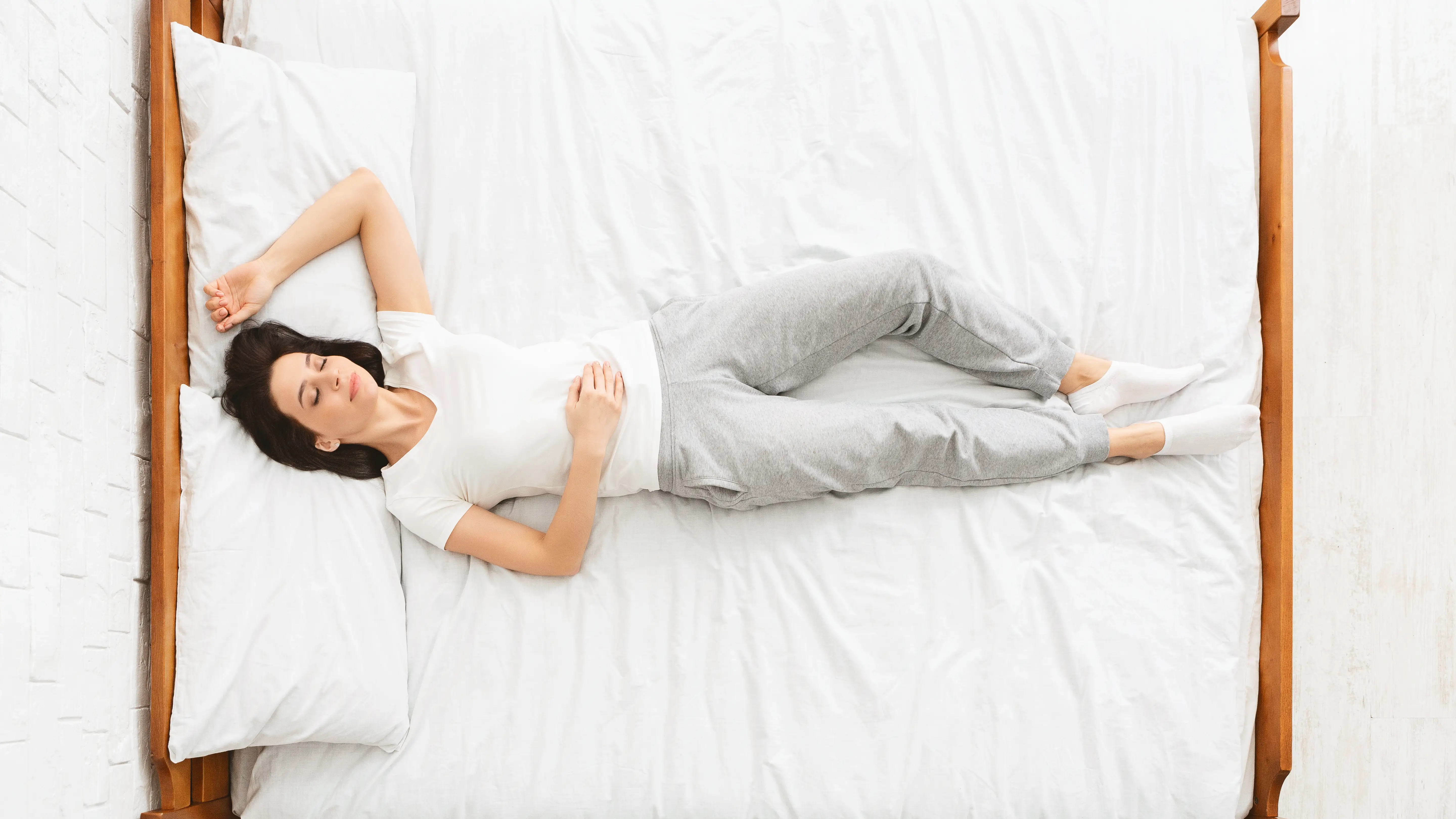Sleep is a fundamental aspect of overall health, essential for physical health and mental well-being.
However, individuals suffering from intercostal muscle strain often face significant challenges in achieving restful sleep. This type of strain can lead to pain and discomfort, particularly when shifting positions or taking deep breaths, disrupting the natural sleep cycle.
In this article, we will discuss the impact of this injury, its symptoms, causes, and tips to improve sleep comfort if you’re suffering from intercostal muscle strain.
What is intercostal muscle strain?

Intercostal muscle strain refers to an injury affecting the muscles located between the ribs, which are essential for facilitating breathing and upper body movement.
This strain can occur due to excessive physical activity, sudden movements, or trauma, often resulting in pain, discomfort, and difficulty in breathing. Symptoms may include sharp or aching pain during movement, coughing, or deep inhalation; additional symptoms and causes will be discussed in detail in upcoming sections.
Symptoms of Intercostal Muscle Strain
Symptoms of intercostal muscle strain can vary from one person to another; however, understanding these symptoms is crucial for early diagnosis and treatment, as they can significantly impact a person's mobility and quality of life.
Sharp Pain Between Ribs
Intercostal muscle strain is characterized by several distinct symptoms, primarily manifesting as sharp pain between the ribs.
This type of pain often intensifies during activities such as deep breathing, coughing, or twisting motions, making everyday tasks uncomfortable for those affected.
The sharp pain can vary in intensity, ranging from mild discomfort to severe anguish, depending on the extent of the strain.
Discomfort When Breathing, Coughing, Sneezing, or Lying Down
This discomfort often intensifies with movement or specific activities that engage the chest muscles. Patients may experience sharp or aching sensations that can radiate to the back or abdomen, making simple tasks challenging.
Additionally, individuals may find it difficult to lie in certain positions due to heightened sensitivity in the affected area.
Muscle Spasms or Tenderness
Individuals may experience sharp or aching pain, particularly during movements such as twisting the torso or taking deep breaths.
This discomfort can radiate to nearby regions, leading to a sensation of tightness in the chest or back. In addition to muscle spasms, tenderness upon palpation is common, which may exacerbate the pain.
Localized Swelling
Localized swelling may occur in the area surrounding the injured muscles. This swelling is a result of inflammation as the body responds to the strain. Individuals may also experience tenderness when the affected area is touched, further indicating muscle injury.
Causes of Intercostal Muscle Strain
Intercostal muscle strain occurs due to various factors that involve the muscles situated between the ribs.
Understanding these causes is crucial for the prevention and effective management of intercostal muscle strain.
Overstretching
One of the primary causes of this condition is overstretching, which often happens during activities that require sudden or forceful movements.
For instance, individuals engaging in sports that involve rapid trunk rotation or lateral bending, such as tennis or golf, may inadvertently stretch their intercostal muscles beyond their normal limits.
This overstretching can lead to micro-tears in the muscle fibers, resulting in pain and discomfort.
Know more about How Does Exercise Affect Sleep.
Intense Coughing
Chronic respiratory conditions, such as bronchitis or asthma, can lead to persistent coughing episodes.
The repetitive contraction of the intercostal muscles during intense coughing can contribute to fatigue and strain, making these muscles vulnerable to injury.
In severe cases, a single bout of violent coughing can be sufficient to cause a strain, particularly if the individual has pre-existing muscle fatigue or weakness.
Trauma to the Chest
One of the main causes of intercostal muscle strain is trauma to the chest, which can occur due to accidents, falls, or sports injuries.
Such trauma may lead to overstretching or tearing of the intercostal muscles, causing pain and discomfort during normal breathing or physical activity.
The severity of the strain often correlates with the force and nature of the impact, highlighting the importance of protective measures in high-risk activities.
Sports Injuries
Sports injuries remain a prevalent cause of intercostal muscle strain. Athletes often push their bodies to the limits during training or competition, increasing their risk of injury.
Collisions, improper technique, or inadequate warm-up can further exacerbate the likelihood of sustaining an intercostal muscle strain in sports settings.
Repetitive Movements
Individuals engaged in occupations or sports that require frequent bending and rotating motions may be more susceptible to this type of strain.
Over time, these repetitive actions can wear down the muscle fibers, leading to fatigue and ultimately increasing the risk of injury.
Why Sleep Is Difficult With Intercostal Muscle Strain

Intercostal muscle strain can significantly disrupt sleep patterns, making rest difficult. These difficulties can manifest themselves in various forms, such as breathing difficulties, limited movement, muscle spasms, and sleep deprivation.
Breathing Difficulty
The intercostal muscles, located between the ribs, play a crucial role in the mechanics of respiration. When these muscles are strained, any attempt to breathe deeply can result in discomfort and pain, making it challenging to find a comfortable sleeping position.
The body instinctively seeks to minimize pain during sleep, often leading to shallow breathing, which further exacerbates the feeling of breathlessness.
Check the Best Sleeping Position for Breathing Problems.
Limited Movement
The limitations in movement caused by intercostal muscle strain can make it difficult for individuals to change positions throughout the night. Many people naturally shift positions to alleviate discomfort or find a better angle for breathing.
However, when movement is restricted, this leads to an increased sense of helplessness and frustration.
Know more about Sleep-Related Movement Disorders.
Muscle Spasms
The intercostal muscles, located between the ribs, play a crucial role in facilitating breathing and maintaining upper body stability.
When these muscles are strained, individuals often experience muscle spasms, which can cause acute pain and discomfort, particularly when lying down or shifting positions during sleep.
The involuntary contractions associated with muscle spasms not only hinder the ability to find a comfortable sleeping posture but also lead to frequent awakenings, exacerbating the overall sleep deprivation impact.
Sleep Deprivation Impact
The pain from intercostal strain can result in heightened anxiety and stress levels, further complicating the ability to achieve restful sleep and contributing to sleep deprivation.
As one struggles to manage discomfort, the mind may become preoccupied with the sensation of pain, making it increasingly difficult to fall asleep or stay asleep.
This cycle of pain and disrupted sleep can lead to a range of negative health outcomes, including fatigue, impaired cognitive function, and diminished mood.
How sleeping positions affect intercostal muscle strain

One of the lesser-known factors that can exacerbate this condition is sleeping position. The way we sleep can either alleviate or worsen the strain on these muscles, making it crucial to adopt positions that promote healing and comfort.
Best Sleeping Positions for Intercostal Muscle Strain
When dealing with intercostal muscle strain, choosing the right sleeping position is crucial for recovery. The best sleeping positions involve lying on your back or side, as these positions help to minimize pressure on the ribcage and promote relaxation of the intercostal muscles.
- Elevated Back Sleeping: Elevated Back Sleeping involves using pillows or a wedge to raise the upper body while lying on the back. This position alleviates pressure on the intercostal muscles, allowing for more relaxed breathing and reduced tension in the chest area. By keeping the spine aligned and reducing strain, this sleeping posture can aid recovery.
- Side Sleeping: Side sleeping can provide relief, particularly on the side opposite to the strained muscle, as it allows for a more natural alignment of the spine and ribs. This position encourages better airflow and minimizes discomfort while resting.
- Recliner Sleeping: Utilizing a recliner can also be beneficial for those with intercostal muscle strain. A recliner allows individuals to find a comfortable angle that supports their back while reducing pressure on the ribcage. With the right adjustments, a recliner can offer optimal support and promote a restful night's sleep, which is essential for healing.
Sleeping Positions to Avoid
When considering sleeping positions to avoid intercostal muscle strain, it's essential to prioritize comfort and alignment.
Avoiding certain positions can significantly contribute to a more restful night's sleep and improved well-being.
- Stomach Sleeping: One position to avoid if you’re suffering from intercostal muscle strain is stomach sleeping. This posture often forces the neck and spine into unnatural angles, leading to increased strain on the intercostal muscles. The pressure on these muscles can exacerbate discomfort, particularly if there is pre-existing tension or injury. Additionally, stomach sleeping can lead to misalignment of the spine, further contributing to muscle strain.
- Injured-Side Sleeping: While it may seem instinctive to lie on the side of an injury for comfort, doing so can put undue pressure on the already strained intercostal muscles. This pressure can hinder recovery and potentially prolong pain. Instead, consider sleeping on your back or the uninjured side with supportive pillows that alleviate strain on your torso.
- Flat on Back Without Support: This position may cause the ribs to expand unevenly during breathing, leading to discomfort and potential strain in the intercostal muscles. Additionally, sleeping flat on the back without support can exacerbate postural issues, placing undue stress on the ribcage and surrounding musculature.
Tips to Improve Sleep Comfort With Intercostal Pain
Intercostal pain can significantly disrupt sleep comfort, making it essential to adopt strategies that alleviate discomfort during rest.
By integrating these techniques into your pre-sleep routine, you create a more conducive environment for relaxation and rest, ultimately leading to a more restorative sleep experience.
Apply Ice or Heat Before Bed
One effective strategy is to apply ice or heat before bed. Applying a cold pack can help reduce inflammation and numb sharp pain, while heat therapy promotes blood circulation and relaxes tense muscles.
By incorporating this practice into your nightly routine, you may find it easier to drift off into a restful sleep, minimizing discomfort during the night.
Use Supportive Pillows
Pillows that offer adequate support for the back and neck can help maintain proper spinal alignment, reducing strain on the intercostal muscles.
Consider using a contour pillow or additional cushions to bolster areas that require extra support, thus minimizing pressure on the ribcage and enhancing overall comfort throughout the night.
Limit Movement While Sleeping
It is advisable to limit movement while sleeping to prevent exacerbating intercostal pain. Finding a comfortable sleeping position, such as lying on your side with a pillow between your knees or adopting a reclined position, can help reduce movements that might irritate the affected muscles.
Gentle Stretching
Gentle stretching can play a crucial role in alleviating intercostal pain and enhancing sleep quality. Engaging in light stretching exercises before bedtime helps to loosen tight muscles and improve flexibility, which can reduce the intensity of pain.
Simple movements, such as side stretches or deep breathing exercises, can be particularly beneficial.
Breathing Exercises
One effective approach is to incorporate breathing exercises into your nightly routine. These exercises promote relaxation and help alleviate tension in the intercostal muscles, thereby reducing discomfort. Deep breathing techniques, such as diaphragmatic breathing, can enhance oxygen flow and create a calming effect, which may facilitate a more restful sleep.
Over-the-Counter Pain Relief
Over-the-counter pain relief options can provide temporary intercostal muscle strain treatment, allowing for improved sleep comfort.
Nonsteroidal anti-inflammatory drugs (NSAIDs) are commonly used to manage mild to moderate pain and can be taken before bedtime to minimize discomfort during the night.
However, it is important to consult with a healthcare professional before starting any medication regimen.
Sleep Hygiene Tips for Better Rest While Healing
Maintaining proper sleep hygiene is essential for better rest, particularly when healing from intercostal pain.
With a few simple tips and prioritizing some practices, you can significantly enhance your overall sleep quality, facilitating a more effective recovery from intercostal pain.
Maintain a Consistent Sleep Schedule
Maintaining a consistent sleep schedule is crucial for individuals recovering from intercostal pain. By going to bed and waking up at the same time each day, your body can better regulate its internal clock, leading to improved sleep quality. This consistency aids in the intercostal muscle strain recovery time, as restorative sleep is essential for recovery.
Create a Calm, Pain-Friendly Sleep Environment
To enhance recovery from intercostal injury, it is essential to create a calm, pain-friendly Sleep environment. Start by ensuring your bedroom is free from distractions, such as electronic devices and excessive noise. Consider using blackout curtains to block out light and maintain a comfortable temperature.
Additionally, invest in a supportive mattress and pillows that alleviate pressure on your torso, promoting better spinal alignment.
Establishing a consistent sleep schedule can further aid in improving sleep quality, allowing your body to heal more effectively.
Avoid Stimulants and Heavy Meals Before Bed
Consuming caffeine or nicotine in the evening can interfere with your ability to fall asleep, while large, rich meals may lead to discomfort and disrupt your rest. Instead, aim for a light snack if needed and opt for calming herbal teas that promote relaxation.
When to Seek Medical Help
In some cases, intercostal muscle strain can be indicative of a serious issue that requires professional attention.
Early intervention can prevent complications and facilitate appropriate treatment, ensuring better health outcomes.
Pain Worsening or Lasting Beyond 1–2 Weeks
It is crucial to monitor the duration and intensity of the pain. If the pain worsens or lasts beyond 1–2 weeks, it is advisable to seek medical help. Prolonged intercostal pain may indicate underlying conditions that require professional assessment, such as rib injuries or respiratory issues.
Symptoms Resembling Heart Problems
If you experience persistent or severe chest pain, shortness of breath, or discomfort radiating to the arms, neck, or jaw, it is imperative to consult a healthcare professional immediately.
Bruising, Swelling, or Signs of a Rib Fracture
It is crucial to seek help if you experience significant bruising, swelling, or signs of a rib strain. These symptoms may indicate a more serious underlying condition, such as a fracture that could lead to complications like pneumothorax.
FAQs
How long will I have trouble sleeping with intercostal muscle strain?
Generally, mild strains may lead to sleep issues for a few days, while more severe strains could prolong discomfort for several weeks. It is crucial to seek appropriate medical advice and consider treatments such as rest, physical therapy, and pain management strategies to alleviate symptoms.
Why is the pain from the torn intercostal muscle worse when I lie down?
When lying flat, any strain or injury to these muscles can lead to heightened sensitivity and pain, as the body’s weight compresses the ribcage. Additionally, certain positions may restrict lung capacity, leading to shallow breathing that further aggravates the discomfort associated with an intercostal muscle strain.
Should I take pain relievers before bed for intercostal muscle strain?
When dealing with an intercostal muscle strain, taking pain relievers before bed may offer some relief. These medications can help reduce discomfort and facilitate a better night's sleep, allowing your body to heal. However, it is essential to consider the specific type of pain reliever and consult a healthcare professional to ensure it is appropriate for your situation.
Is it safe to sleep on the side of the strain?
Sleeping on the side of an intercostal muscle tear can be concerning, as it may exacerbate discomfort and hinder the healing process. While many individuals find side sleeping comfortable, it is vital to assess the specific nature of the strain.
Conclusion
Intercostal muscle strain can significantly affect your sleep quality due to discomfort and pain. To enhance your sleep, consider adopting a side-sleeping position with a pillow placed between your knees for support.
Additionally, using a supportive mattress and pillows can help alleviate pressure on the affected area. Applying heat or ice before bedtime may also provide relief and promote relaxation. It’s crucial to avoid any movements that exacerbate the pain while getting in and out of bed.
Taking proactive measures can facilitate more restful sleep despite intercostal muscle strain. Prioritizing comfort and support will ultimately contribute to recovery.
Jessica H.
Jessica is a reviewer, writer, and sleep enthusiast at Sleepiverse. Jessica graduated with her master's degree in Nursing research and education. She is a registered nurse and currently works in the Intensive Care Unit. Since becoming a nurse, Jessica has worked the night shift, which means a disrupted sleep schedule. Knowing she needed to function at her best while caring for patients at night, she spent a lot of time researching how to sleep well with a difficult schedule.


